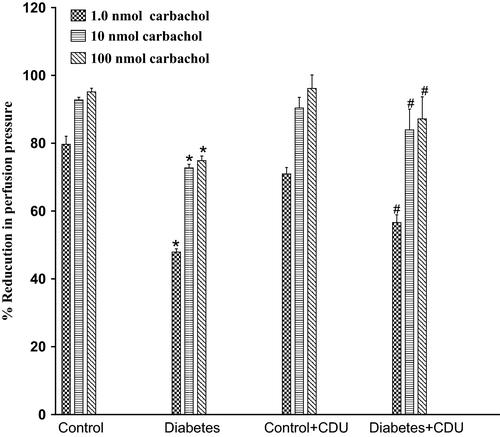11,12-Epoxyeicosatrienoic acid induces vasodilator response in the rat perfused mesenteric vasculature
引用次数: 2
Abstract
- Epoxyeicosatrienoic acids (EETs) are endogenous ligands that undergo hydrolysis by soluble epoxide hydrolase (sEH). The responses of 11, 12-EET in comparison with other vasodilator agonists including carbachol and sodium nitroprusside (SNP) were investigated. The effect of 1-cyclohexyl-3-dodecyl urea (CDU), a sEH, was tested on the vasodilator effect induced by 11, 12-EET in the perfused mesenteric beds isolated from normo-glycaemic and type-1 STZ-diabetic rats.
- In the perfused mesenteric beds of control and diabetic animals, 11, 12-EET produced vasodilation in a dose-dependent manner. The vasodilator response induced by 11, 12-EET was significantly decreased in tissues obtained from diabetic animals, but this was significantly corrected through inhibition of sEH.
- The effects of nitric oxide synthase inhibitor, cyclo-oxygenase inhibitor, specific potassium channel inhibitors, soluble guanylyl cyclase inhibitor and transient receptor potential channel V4 inhibitor, on vasodilator response to 11, 12-EET were investigated.
- In tissues isolated from control animals, vasodilator responses to 11, 12-EET were not inhibited by acute incubation with l-NAME, l-NAME with indomethacin, glibenclamide, iberiotoxin, charybdotoxin, apamin or ODQ.
- Incubation with the transient receptor potential channel V4 inhibitor ruthenium red caused significantly reduced vasodilator responses induced by 11, 12-EET.
- In conclusion, results from this study indicate that 11, 12-EET has a vasodilator effect in the perfused mesenteric bed, partly through activation of vanilloid receptor. A strategy to elevate the levels of EETs may have a significant impact in correcting microvascular abnormality associated with diabetes.

11,12-环氧二碳三烯酸在大鼠灌注肠系膜血管中诱导血管扩张反应
环氧二碳三烯酸(EETs)是一种内源性配体,可被可溶性环氧化物水解酶(sEH)水解。研究了11,12 - eet与其他血管扩张激动剂(包括萘酚和硝普钠)的反应。研究1-环己基-3-十二烷基脲(CDU, sEH)对11,12 - eet对正常血糖和1型stz糖尿病大鼠肠系膜床血管舒张作用的影响。在对照组和糖尿病动物的肠系膜灌注床中,11,12 - eet以剂量依赖的方式产生血管舒张。11,12 - eet诱导的血管扩张反应在糖尿病动物的组织中显著降低,但通过抑制sEH显著纠正了这一点。研究了一氧化氮合酶抑制剂、环氧合酶抑制剂、特异性钾通道抑制剂、可溶性胍基环化酶抑制剂和瞬时受体电位通道V4抑制剂对11,12 - eet血管舒张剂反应的影响。在从对照动物分离的组织中,l-NAME、l-NAME与吲哚美辛、格列本脲、iberiotoxin、charybdotoxin、apamin或ODQ急性孵育均未抑制血管扩张剂对11,12 - eet的反应。与瞬时受体电位通道V4抑制剂钌红孵育可显著降低11,12 - eet诱导的血管舒张反应。综上所述,本研究结果表明11,12 - eet在灌注的肠系膜床中具有血管扩张作用,部分是通过激活香草素受体来实现的。提高EETs水平的策略可能对纠正糖尿病相关微血管异常有重要影响。
本文章由计算机程序翻译,如有差异,请以英文原文为准。
求助全文
约1分钟内获得全文
求助全文

 求助内容:
求助内容: 应助结果提醒方式:
应助结果提醒方式:


